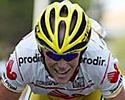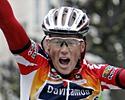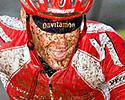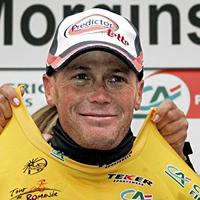
Recently on Cyclingnews.com |
An interview with Chris Horner, August 17, 2007
Ready for (two) more!
Chris Horner is a professional athlete that was given a rare item in sport, a second chance. After making it to the big show across the Atlantic early in his career, Horner decided to give up his spot and return to the States where he felt more comfortable. After dominating the American scene, he went back to Europe in 2004 at the age of 32, taking a pay cut and a big risk. The gamble paid off with a win in the sixth stage of the 2005 Tour de Suisse and his first trip to the Tour de France. This year, maturity and confidence allowed him to help Cadel Evans to the second step on Le Tour's podium while finishing fifteenth himself. Now he is ready for the final, and perhaps most exciting, chapters in his cycling career, as he told Cyclingnews' Mark Zalewski.
Horner on Lance leavingChris Horner has never been shy about his opinions regarding Lance Armstrong in the past. And when he heard the news about Tailwind Sports ending its search for a new sponsor, he had some hard-hitting analysis of Armstrong's and the company's decision. "I read what Lance has said about the sport, and it is just ridiculous to read something so stupid, from a guy who has made his career off the sport. Now they can't find a sponsor and say they are pulling out just because they don't want to look for one? I don't believe it. You tell me Lance is giving up money? He raced his whole career looking for it, because he was a businessman more than the love of the sport. Now he is telling us that it isn't a good place for the sport so we are pulling out. Are you really telling me that? "All it is is he can't find a sponsor. Instead he's saying, 'I'm Lance Armstrong, I finally couldn't accomplish something so we're pulling out instead.' If I'm wrong, prove me wrong Lance -- go out and find a sponsor! Instead it was 'we're leaving, I don't like the sport anymore'. No, just leave and get out. I'm sorry if those weren't his exact words, but if what I am reading is, then it is ridiculous and irresponsible." "It makes it a bit tougher for guys like myself, but at the same time I don't see that too many of those guys affect me. But some riders might not have jobs next year, assuming that more teams don't come in. Or they won't be with a ProTour team. That's a possibility, and that might be me too! Because Lance wants to get out of the sport he is going to unemploy half of his team. Personal opinion again, but that has to be the biggest bullshit story I have ever read!" "All these people can say what they want about the sport going downhill right now... are they crazy? Were they not in London? Did Lance forget about it? How do you make those comments when you saw what happened there? To have a start and stage there, plus the stage in Belgium, that alone justifies the money to have a ProTour team. Nothing else even matters! Take those first three days of the Tour de France, and it automatically proves Lance wrong. Undeniable fact! I don't care what anybody wants to come back and say how much they love Lance, it's an undeniable fact that the first three days make it worth it. That's not even counting the people watching it on TV around the world! That is just the people who came out. In London they had Wimbledon, a huge concert event, Formula 1... and we did 125 miles the first day and there weren't 10 miles of a gap where if you stopped you wouldn't have been peeing on someone's foot!" "Anyone whose job is to look at sports and find where best to put your money, and says it's not in cycling, has never been to a cycling event. Or maybe he went to Valley of the Sun! Maybe someone can go back and look at the different sponsors of Tour de France teams and prove to me they lost money from advertising at some point, but I don't think so. $3-7 million dollars for a sponsorship, and you cannot tell me it doesn't justify what the Tour de France brought you -- just the first three days! Anyone who prints what they want in USA Today or wherever has never been the Tour de France before or any race of value. Or is a complete idiot... probably the latter." |
To say that Chris Horner is good for an interesting sound bite is like saying the French love wine or Belgians love beer. Horner usually has something interesting to say and is rarely reluctant to share it. Maybe this is why he is often the crowd favourite, especially when he returns to the States to race. Such was the case last weekend near Chicago where he and Predictor-Lotto team-mate Freddie Rodriguez were the star attractions at the Tour of Elk Grove.
In between races Horner sat down with Cyclingnews to talk about the Tour, the sport and where his career is headed. His 15th place overall in the Tour was impressive, especially considering that he wasn't focused on the overall classification. "I wouldn't say I wasn't trying as much as it wasn't a priority!" the always easy going Horner joked about his Tour finish. "It was about tenth down on the important list to do."
Horner's number one item on that list was making sure team leader Cadel Evans was protected as long as possible heading into the final climbs. "Cadel needed help covering, getting bottles, staying out of the wind and making sure he starts at the front of the final climb without any effort spent to be there. Then when you go up the climb you have to make sure that if he doesn't go with the first good attack that maybe I have to bring it back. Luckily for me when the first group went, all the favourites followed it and that was the move. So I never had to get on the front for him on the last climbs, that would have been a huge effort! But I was there and capable, at least for one time."
"Because Lance wants to get out of the sport he is going to unemploy half of his team? Personal opinion again, but that has to be the biggest bullshit story I have ever read!"-Chris Horner doesn't mince words - ever |
Still, when considering the amount of time Horner had to ride in the wind to protect his team-mates, in addition to fetching bidons and covering attacks, a fifteenth place is not shabby at all. But Horner said that he still had a little more left in the tank. "You want to make the time cut and make sure the legs are open the next day, so you still go hard but the very low side of hard -- without any lactic effort.
"I was maybe losing a minute or so over each time trial. And as soon as the favourites go up the road I don't even need to stay with the seven or so I am with. I stay with them long enough to make sure it doesn't come back together and have him completely outnumbered, but once you see it's not coming back I just sit up and save the legs."
While he realises that a top ten spot is not a far fetched idea, he said he enjoys the role as a first lieutenant. "Without a doubt I would much rather be riding for someone who can win the Tour de France, like Cadel, than for myself who could have been tenth. I'm pretty certain I could finish top-ten, but it is much more enjoyable working for someone who can be second or first."
Unfortunately for Horner, the gap between fifteenth and top ten is vast. "A twenty-five minute gap!" he joked. But in a more serious tone he said it is affecting his contract negotiations for next year. "That is the only down side, that you don't get appreciated financially the way you would as if you rode top ten. I hope the team can appreciate what I did for Cadel and we can come to a contract that justifies what I am riding like."
My mama told me, you better shop around...

|
Just how difficult can contract negotiations be for a 35 year old American finishing the Tour in fifteenth while helping a team-mate win second overall in his third year on a ProTour team? "It's absolutely frustrating -- it's almost to the point of insulting," he said.
"To do the ride that I have done so far this year and to do the ride I did in the Tour, to be arguing over salary that is not even close to what guys who are top ten in the Tour normally make. I'm shopping -- I'm not sure if [Predictor-Lotto] has the money, but I assume they do since they haven't told me they don't have it, they just tell me they want to pay less. If I have to I'll shop around and get a new team."
Horner has not had the normal progression in Europe as a professional, and he understands this. His signing with Saunier Duval in 2004 was a leap of faith for the smaller ProTour team. Luckily for both, the chance paid off with a Tour de Suisse stage win, and a near Tour stage win. This, in turn, helped him move up the food chain to the prominent Davitamon-Lotto team for 2006. However, he was still considered an unknown quantity, and his salary reflected that.
"I believed that until [Predictor-Lotto] came and offered me the contract," he said regarding negotiations for next year. "I understood that when I went to Saunier Duval why they were paying me a minimum wage salary. I understand the salary that Davitamon-Lotto paid me, that was justifiable and what I was worth and I didn't argue that. I performed better than what they paid me, but at the time I signed it was what I was worth.

|
"Now it's justifiable to say that I am worth this much more. If one team won't offer you what you are worth then you go somewhere else. There are a bunch of different teams out there where I could be happy."
Horner used some simple math to arrive at the number he is looking for in the final two-year contract of his racing career. "You look at the Tour and you are going over the second-to-last climb, there are 10-15 of us. You take my salary and it's about a third of the next-best rider in the group -- not the best rider, but the next rider that is better than me -- he is making three times what I am making.
"It gets hard to be appreciated when I am asking for half of what the worst paid rider in that group is making. Look at a team like Astana, regardless of all the problems they had, Vino had Klöden, Kashechkin. Caisse d'Epargne, what is Pereiro or Karpets making? I can certainly ride like Pereiro. At CSC, what is Schleck or Vande Velde making? All of those guys are making double or triple what I am making, and doing the same work."

|
Another reason why Horner is asking for the amount he is, is that his time as a professional is limited. "I don't think at 35 I am going to reinvent myself. Certainly I could be a better GC rider if the team was willing to put more effort into me, like give me a TT bike to train with at home. I don't even have that! We also ran into multiple problems at Romandie when I was in the leader's jersey."
A noticeable change
Riding in this year's Tour, Horner noticed a difference in the racing -- something that he said bodes well for his racing future. "I need the sport to keep going the way it is going," he said, regarding the crackdown on doping. "I can't ride against a guy preparing like Vino. It can't be done. You get to the start line and you see that some of these guys have a 50 km jump on you! The sport is taking care of those problems. No matter what people thought of the Tour this year, me as a rider I liked seeing that happen."
"You can see the differences," he said. "As a rider it is easily perceptible, or as a well-educated fan sitting at home. You get to a climb and everyone has maybe one or two team-mates with him -- that is doable. You can't have a leader's team getting to the final climb with five guys on the front, like every year from three years back all the way back. It is impossible to ride the front with your whole team and get to the final climb with most of your team still on the front -- and be ready to come back and do it day in and day out."
"When I was with Mercury we were the number one team -- the best riders on the best team in the States. We go into a race like Redlands and have seven guys on the road race, the Sunset Loop. I'm finishing there with two team-mates and they have one foot in the grave! I'm riding the front to get them over the last climb so they can help me down the descent.
"That is an 85 mile race, so you are telling me that a 150 mile race over four mountain passes you can finish with 7-8 guys on the last climb? I don't believe it to be possible. Even with Rasmussen's team, and he had a lot of questions about him, he was arriving with only two guys on the front and one would get dropped on the final climb. That's what I mean by a change."
The more things change, the more they stay the same
The announcement of the end of the Discovery Channel team, combined with the signing of multiple prominent riders by the Slipstream-Chipotle team, looks to be a changing of the guard for American cycling in Europe. Horner had some interesting insight into these recent changes in terms of how it reflects the progression of American cycling.
"Freddie [Rodriguez] and I were talking about this, it's the same scenario: big American team comes on right the same year when another one leaves. It was the same with Motorola, they left and Postal came in. Now Vaughters' team comes on. The problem is that something good happens at the same time something bad happens, so American racing has always stayed the same. The line is amazing, it never really goes down, never goes up -- the problem is the economy has gone up but the money [in the sport here] hasn't. If you look at prize money in America it is relatively the same as when I was a kid. They had these big money races like Elk Grove, but they were the Thrift Drug and CoreStates. Philly is still around but they are racing for $40,000 now, not $150,000."
"It's always been that way in America, same with races," he continued. "A good race leaves, another comes around. If you took the races from when I started riding, and you add all these good races, you would have this stacked calendar that would be so incredible -- I wouldn't even go to Europe! Can you imagine doing California, Dupont, Thrift Drug, First Union, Georgia, West Virginia, Utah and now Missouri? What would you need to go to Europe for? The reason why I am in Europe is that I don't want to go to races like Valley of the Sun! I don't want my wheel going over the yellow line, being DQ'd and not even told until after winning the race. Those are the kind of races I don't want to do, where you are completely unappreciated by the people putting the race on."
Cross-ing over

|
But he is not yet done with his road season, with the world championships a possibility. "Originally I was doing World's, but there is a 'cross race at Vegas, so it might be possible if I can make the whole sponsorship stuff happen. It could be either. With the season I've had coming out of the Tour de France, I don't know if I can do World's and still have the motivation. But if I come out of the Vuelta and am just flying with the same form I have coming out of the Tour, I'll choose World's."

|
"If you want to do 'cross, you have to have points to get a better starting position. Right now I still have 'cross points if I show up at Vegas. But if I don't start until late October I won't have any and I'll have to start at the back. Looking at a race like Gullister last year, I have no doubt that I could have ran with anyone outside of the top 3-5 guys, because I started 60th... after the first lap! I finished 11th, passing guys non-stop."
And before hanging up the bike, what is Horner looking for out of his final two years? "More wins! There are so many good wins in Europe that I would take any. If I had a preference, which every rider does, then you have the Classics. Liege, Amstel Gold, those would be fantastic. Winning a stage at the Tour, world championships, that would be great also."

